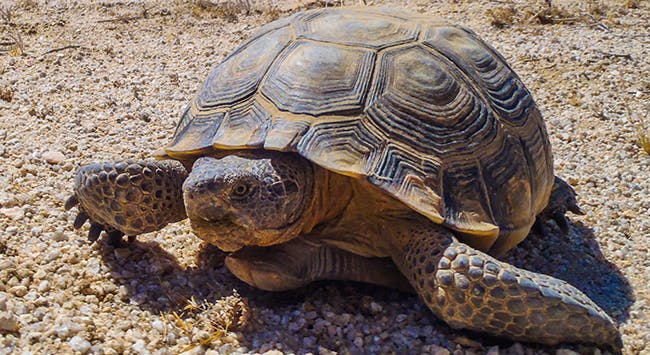One of the regions that I have become more and more familiar with and in awe of through my work at Defenders is the California desert. This area of our country is often viewed by those who don’t live in or around it as barren, blistering and uninhabitable. But that couldn’t be further from the truth. While the desert life is not for everyone, life in the desert is incredible. And right now, there are two opportunities to protect this vital and fascinating landscape: the Desert Renewable Energy Conservation Plan (DRECP) and three newly proposed California desert national monuments.
The DRECP is a desert-wide plan that aims to identify the most appropriate places for renewable energy while also providing needed conservation to plants and animals. This conservation is especially important in the West Mojave that harbors some of the most unique – and threatened – species of plants and animals in the United States. The West Mojave provides vital corridors (especially with a changing climate) for migrating wildlife and important (and dwindling) habitat for imperiled species like the Mohave ground squirrel, desert tortoise, golden eagle and many others. Much of this part of the desert has already been impacted by a variety of development pressures.

Places like Indian Wells Valley, Fremont Valley, North of Kramer Junction, Granite Mountains, Pisgah Valley and the north slope of the San Bernardino Mountains are particularly essential. My colleague here at Defenders who lives in the California desert region tells me about the golden eagles that soar over the Granite Mountains, the male desert tortoises fighting over female mates near Fremont Valley, the bighorn sheep that come down from the Cady Mountains into the Pisgah Valley in the winter to forage on winter annual plants and the green riparian corridors that wind down from the San Bernardino mountains into the dry desert landscape.
Concurrent with our work to conserve these important lands and plan responsibly for renewable energy development through the DRECP, we now also have an exciting opportunity – we are part of a diverse coalition that is turning to President Obama to designate the Mojave Trails, Sand to Snow and Castle Mountains National Monuments to ensure significant protections for these desert areas. We must protect these proposed monument lands and the lands in Pisgah Valley so that our desert wildlife can continue to survive and thrive in their native habitat into the future.

National Monument designation is made possible through the Antiquities Act, which grants presidents the ability to proclaim “historic landmarks, historic and prehistoric structures and other objects of historic or scientific interest” as national monuments. National monuments recognize and protect cultural and ecological wonders all over the United States and outlying territories and include such sites as mountains, deserts, bridges and statues. Many serve multiple conservation functions – for example, in addition to conserving critical areas for imperiled wildlife, the Mojave Trails National Monument would also protect the most intact stretch of historic Route 66.
California senator Diane Feinstein has agreed that the Golden State’s golden sand deserts deserve protection, and she too, is encouraging President Obama to make that protection permanent.
Especially as we look to stem the impacts of climate change by decreasing our reliance on fossil fuels through renewable energy development, we must recognize that protection of intact habitat is key. The DRECP provides the Bureau of Land Management with an opportunity to do the right thing for wildlife: protect the remaining public land habitat for struggling species in the West Mojave, while the proposed Mojave Trails National Monument is an opportunity for the president to make a difference not only for wildlife, but for the many other values this area harbors. The wildlife, scenic vistas, mountains and waters in the California desert deserve permanent protection for all to be able to enjoy into the future.





Follow Defenders of Wildlife
facebook bluesky twitter instagram youtube tiktok threads linkedin